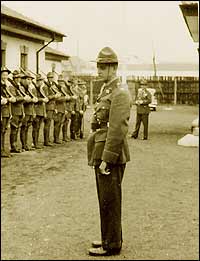
Page 3 of 8 |
Continued from page 2
''Immediately when the war broke before dawn on Dec. 8, 1941, they sent squads of military through the city, laying their special communications lines,'' said John S. Potter, describing how troops seized the key Chinese city of Shanghai. Japanese raided Allied consulates and seized maps, building inspection reports, aerial photographs, and other material which ''we understood was to be shipped on to Tokyo,'' Potter added.
 Norwood Allman with his civilian militia in Shanghai. (Allman family photo)
Norwood Allman with his civilian militia in Shanghai. (Allman family photo)
|
Donovan's executive officer, Edwin Putzell Jr., said such accounts added context to other raw intelligence, such as radio intercepts and code-breaking. ''It was part of the mosaic of information that was obtained and put together,'' he says. ''It's very difficult for an American to do human intelligence in another environment. It's always been a challenge for our country, and still is.''
Written when the future was still unclouded by historical hindsight, the recently released dossiers provide an eerie prophesy of how World War II would give way to the superpower showdown that spawned the nuclear arms race, wars in Korea and Vietnam, even the recent Cold War-style clash over the collision between a US spy plane and a Chinese fighter.
They also show just how Japan's multipronged attack affected the Japanese themselves.
Electricity, food, clothing were sharply rationed and gas was so limited that ''it got so that one could not take a bath,'' said Russel L. Durgin, a YMCA official in Tokyo for 20 years and Interview No. 16 in a series of debriefings entitled ''Conditions in Tokyo after Dec. 7, 1941.''
Durgin, whose details about Tokyo were of ''unusual value'' because he was one of only seven Americans in Tokyo not interned after Pearl Harbor, said grocers told him that they could not get vegetables because of manpower and transportation problems. Such information had propaganda potential and would have provided insight into how a long war would wreck the Japanese economy.
Though a task force appointed by Clinton to investigate war crimes has so far focused exclusively on Nazi atrocities - work on Japan is expected to start this year - the files it has unearthed are lying in the public domain like untouched Easter eggs, filled with names of internment camp commanders, traitors, and collaborators, both real or simply suspected.
The names are there because the declassification authorization overrode the CIA's blanket authority to keep its sources secret. This has raised privacy concerns because espionage information is often disinformation, or merely wrong. But it has delighted researchers worldwide making pilgrimages to the National Archives II building in a pastoral part of College Park, Md., where some of the sexiest war stories in history are open for public perusal.

